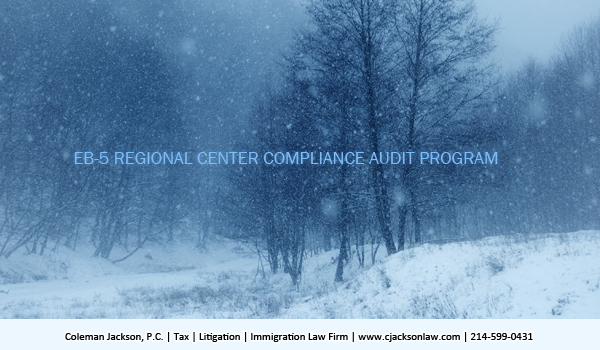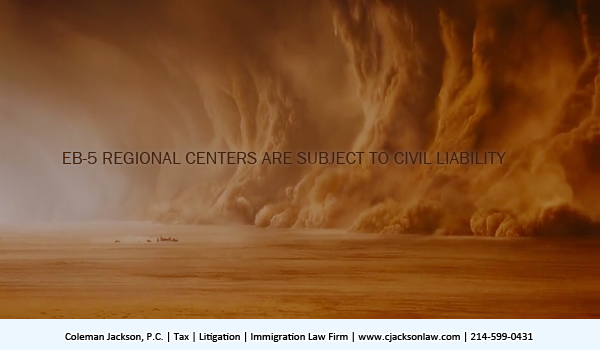By Coleman Jackson, Attorney, CPA
April 05, 2017

On March 20, 2017, USCIS announced the launch of an EB-5 Regional Center Compliance Audit Program. The E-B-5 Regional Center Compliance Audit will be conducted to verify that the regional center is in compliance with applicable laws and authorities governing their eligibility for classification as a regional center under the EB-5 Immigrant Investor Regional Center Program.
The USCIS announcement stated that the EB-5 Audit Team’s Tasks will include the following:
- Review applications, certifications, and associated records;
- Review public records and information on the regional center;
- Verify the information, including supporting documents, submitted with the application(s) and in the annual certification(s);
- Conduct site inspection;
- Review and analyze documents;
- Interview personnel to confirm the information provided with the application(s) and annual certification(s).
The March 20, 2017 announcement also provided specific guidance to EB-5 Regional Centers with respect to preparation procedures for an EB-5 Regional Center Compliance Audit of their regional center.
The results of the EB-5 Regional Center Compliance Audit will be finalized in an audit report that becomes part of the EB-5 Investor Regional Center’s record. The audit will be used to gage or determine whether the EB-5 Regional Center is in compliance with the laws, regulations and policies governing the EB-5 Immigrant Investor Regional Center Program. Indicia of fraud could lead to additional investigations and scrutiny of the EB-5 Regional Center.

Founders of Regional Centers, professionals advising in establishing them and others connected with registering and filing regional center applications are subject to a host of laws, including but not limited to, federal and state securities laws, immigration laws, tax laws and more. See United States v. O’Connor, 158 F. Supp. 2d 697 (E.D. Va. 2001); in this criminal case, an EB-5 Immigrant Investor Regional Center’s founder was found guilty of conspiracy to commit immigration fraud, tax fraud and other serious crimes. State laws could also apply to EB-5 investor ventures gone sour depending upon the nature of the investment, the products, goods and services provided to the public by the regional center. A number of legal practice disciplines could be implicated with respect to EB-5 Regional Centers—immigration law is only one area where legal jeopardy could arise for regional center founders and those who file applications with USCIS on their behalf. Even if a regional center can survive the recently announced E5-5 Regional Center Compliance Audit without-a-scratch, such investigations could uncover violations of other applicable federal and state laws birthing claims by federal and state authorities and even lawsuits by immigrant investors based on breach of contract, fraud and more. Such state law claims are already occurring in Texas.

Texas Business & Commerce Code §27.01 imposes civil liability for false representations of material facts that are relied on by an investor in entering into a real estate or stock transaction. U.S. Quest Ltd. V. Kimmons, 228 F 3rd 399, 406 (5th Cir. 2000). In recent years, common law fraud, breach of contract, negligent misrepresentation, fraud in the inducement and other related claims have been sometimes successfully argued in federal and state courts in Texas with respect to EB-5 investments. For example, Zhang v. Monroe, Civil Action No. 6:13-CV-811 was decided in favor of Lihua Zhang an EB-5 Investor on January 11, 2017 in the United States District Court for the Eastern District of Texas, Tyler Division. Zhang was the Plaintiff in this court case; she raised numerous state court claims in this diversity action in federal court -and she won- involving a soured EB-5 Immigrant Investor Program venture. In Lake v. Cravens 488 S.W. 3rd 867 (Tex. App., – Fort Worth 2016, no pet); the Plaintiff did not properly plead a federal question or allege diversity and got thrown out of Court. Alleging material facts and properly pleading in a lawsuit requires skill. Lawsuits can and are lost on procedural grounds that has nothing to do with the merits of the case. That case, Lake v. Cravens concerned a soured EB-5 Immigrant Investor Regional Center venture.

Due diligence could possibly save an EB-5 immigrant investor a trip to the courthouse; or help them when they go to court. Immigrant investors considering investing in an EB-5 Regional Center must engage in proper due diligence before turning their money over to a regional center. It is important to have a clear understanding as to who owns and operates the regional center; what their economic track record is (not only with respect to the specific regional center being marketed, but, the management teams’ overall business acumen, reputation and success rate in business in general); and what are the return on the regional center investment, if any.
This law blog is written by the Taxation | Litigation | Immigration Law Firm of Coleman Jackson, P.C. for educational purposes; it does not create an attorney-client relationship between this law firm and its reader. You should consult with legal counsel in your geographical area with respect to any legal issues impacting you, your family or business.
Coleman Jackson, P.C. | Taxation, Litigation, Immigration Law Firm | English (214) 599-0431 | Spanish (214) 599-0432








